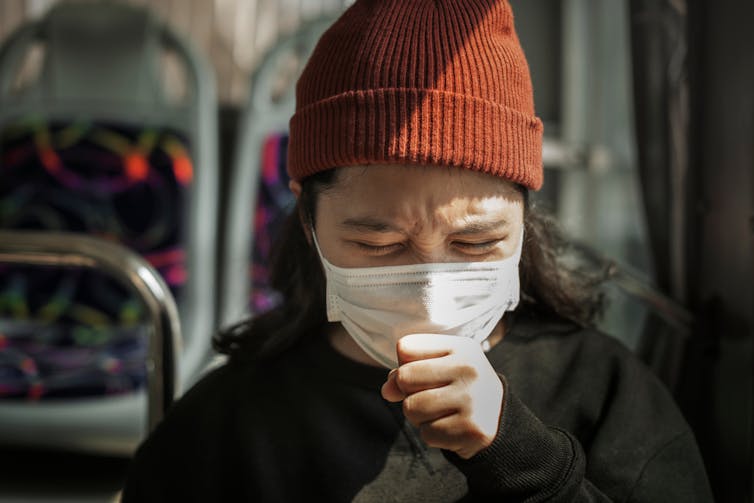Should I wear a mask on public transport?
- Written by Hassan Vally, Associate Professor, La Trobe University
As restrictions ease, many Australians will be wondering if it’s worth wearing a mask on the bus, train or tram to reduce their risk of being infected with coronavirus.
When Deputy Chief Medical Officer Nick Coatsworth was asked about this earlier this week, he said:
If you are a vulnerable person and you have no other means of getting to work or around, it would be a very reasonable thing to do. We don’t think that general, healthy members of the community need to be considering wearing masks in that context.
Earlier, Chief Medical Officer Brendan Murphy said wearing masks on public transport “is not an unreasonable thing to do”.
But the National Cabinet has stopped short of making wearing masks on public transport compulsory. No wonder it can all seem a bit confusing.
So what does fresh evidence say about the benefits of healthy people wearing masks in public? And how do you use this to decide what to do?
Read more: As coronavirus restrictions ease, here's how you can navigate public transport as safely as possible
Yes, wearing a mask does reduce your risk
Until now, the evidence about whether wearing a mask out and about if you’re healthy reduces your risk of coronavirus infection has been uncertain.
But a recent review in The Lancet changes that. As expected, the researchers found wearing masks protected health-care workers against coronavirus infection. But they also found wearing masks protects healthy people in the community, although possibly to a lesser degree.
The researchers said the difference in the protective effect was largely because health workers are more likely to use N95 masks, which were found to offer greater protection than the disposable surgical masks we generally see people wearing out in the community.
Read more: To limit coronavirus risks on public transport, here's what we can learn from efforts overseas
So, the take-home message is that masks, while not offering perfect protection, reduce your risk of coronavirus infection while you’re out and about.
In light of this study, the World Health Organisation (WHO) has updated its advice to recommend healthy people wear masks in public where there is widespread transmission and where physical distancing is difficult, such as on public transport.
But how is this different to what I’ve heard before?
What this Lancet study adds is the best evidence we have so far that healthy people who wear a mask out and about can reduce their chance of infection.
It’s important to stress, the evidence is quite clear that if you’re sick, wearing a mask reduces your risk of transmitting the coronavirus to others.
If you’re sick or have been diagnosed with COVID-19 the clear advice is still to stay home and self-isolate. You shouldn’t be on public transport anyway!
 If you’re sick, you shouldn’t be on public transport. The only exception is if you need to go out to get tested.
www.shutterstock.com
If you’re sick, you shouldn’t be on public transport. The only exception is if you need to go out to get tested.
www.shutterstock.com
Masks also protect others
But how about the other possible benefit of wearing masks on public transport – minimising the risk of you unwittingly transmitting the virus to others if you don’t have symptoms?
Despite some confusing messages from WHO earlier this week, we know “asymptomatic transmission” does occur, although we are yet to pin down its exact role.
For instance, a recent review suggests as many as 40-45% of coronavirus infections are asymptomatic and they may transmit the virus to others for an extended period.
So, preventing asymptomatic transmission is another reason you may choose to wear a mask. That is, rather than wearing a mask to protect yourself, you could wear a mask to protect others.
Read more: Do homemade masks work? Sometimes. But leave the design to the experts
So, what should I do?
Given masks reduce your risk of infection and reduce the risk of you unwittingly passing on the virus to others, you could certainly make a case for routinely wearing a mask on public transport while we have coronavirus in the community.
This case is even stronger if you are at risk of severe illness, for example if you are over 65 years old or have an underlying medical condition such as high blood pressure, heart disease or diabetes.
Read more: Why are older people more at risk of coronavirus?
Alternatively, if you are travelling on a short trip on a train and you have plenty of room to social distance, then you may decide wearing a mask may not be essential given the level of risk on that journey.
However, if you are on a longer commute and the train is crowded and social distancing is difficult, then wearing a mask could well be sensible.
If you do decide to wear a mask, then it’s important to make sure you know how to put it on and take it off correctly. And as no mask offers complete protection, you still need to physically distance where possible and wash your hands.
Read more: Are you wearing gloves or a mask to the shops? You might be doing it wrong
Authors: Hassan Vally, Associate Professor, La Trobe University
Read more https://theconversation.com/should-i-wear-a-mask-on-public-transport-139981





